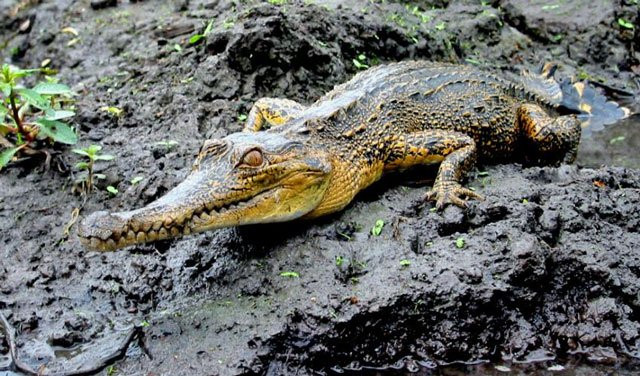Fate of Africa's newest, rarest crocodile tied to once endangered zoo
Until just a few years ago, the West African Slender-snouted Crocodile was hiding in plain sight

The west African slender-snouted crocodile. PHOTO COURTESY: iucn.org
Now, in its struggle to survive, the West African Slender-snouted Crocodile's fate is tied to a zoo in the heart of Ivory Coast's traffic-choked main city, Abidjan, that itself faced an uncertain future not long ago. "It's very frustrating. But it also gives you a desire to throw your whole body and heart into figuring out what needs to happen to make sure it exists in the future," Shirley told Reuters. "This species in particular, it's my baby."
Until just a few years ago, the West African Slender-snouted Crocodile was hiding in plain sight. Before Shirley began his research, the new crocodile and its Central African cousin were considered to be one species. Using genetic testing, he determined they were as different as humans and chimpanzees.
Today, no more than 1,500 West African Slender-snouted Crocodile are believed to exist in the wild, scattered across a territory extending from Gambia to Nigeria - an area nearly the size of the continental United States.
But in the shade of a stand of broad-leafed trees, some three dozen adults -- the largest captive population of the species in the world -- lay stretched out in the dust or bobbed motionless in a newly upgraded pond in the Abidjan National Zoo.
Crocodile takes woman during night swim in Australia
"It makes it a very critical institution for the future of this species," said Shirley, who works for the Florida-based Rare Species Conservatory Foundation. The zoo already has a breeding programme for the crocodiles and is receiving assistance from partner organisations in the United States.
And though a lack of easy access to specialised equipment has forced a certain amount of improvisation, including egg incubators built out of old Coca-Cola refrigerators, survival rates have been remarkably high. "We're roughly around 24 to 25 per cent. And even the percentages we're getting in the U.S., this zoo right here will beat them," said Matt Eschenbrenner of the ABQ BioPark Zoo in Albuquerque, New Mexico, which is assisting the programme.
‘Secret under the water’
Things could easily have been different however. In 2011, following a decade-long political crisis and a contentious presidential election, civil war broke out in Ivory Coast. Soon, gun battles were raging in the neighbourhoods surrounding the Abidjan Zoo.
A jaguar and crocodile battle it out in Brazil
Tia Lama, who has worked there for nearly 25 years, was one of a handful of dedicated employees who braved the violence to feed and care for the animals. "There were personnel who were stepping over dead bodies to go out looking for food. If we didn't, what were (the animals) going to do?" he said.
Despite their efforts, by the end of the months-long war, roughly a quarter of the animals had died. Carnivores were hit the hardest. The zoo's lions were wiped out. But the crocodiles survived. "I told myself there must be a secret under the water that kept them alive," Lama said.
So far, the zoo's breeding efforts have produced around 40 young crocodiles. Some of them are now two years old, and Shirley is negotiating with the government to reintroduce them into the wild -- first in Ivory Coast and then possibly elsewhere in West Africa.
"Man depends on nature. If nature disappears, so will humans," said Barnabe Digbe, who heads the Abidjan Zoo's crocodile department. "And so when you are at the heart of a project to protect nature, you can only be happy about it."



















COMMENTS
Comments are moderated and generally will be posted if they are on-topic and not abusive.
For more information, please see our Comments FAQ